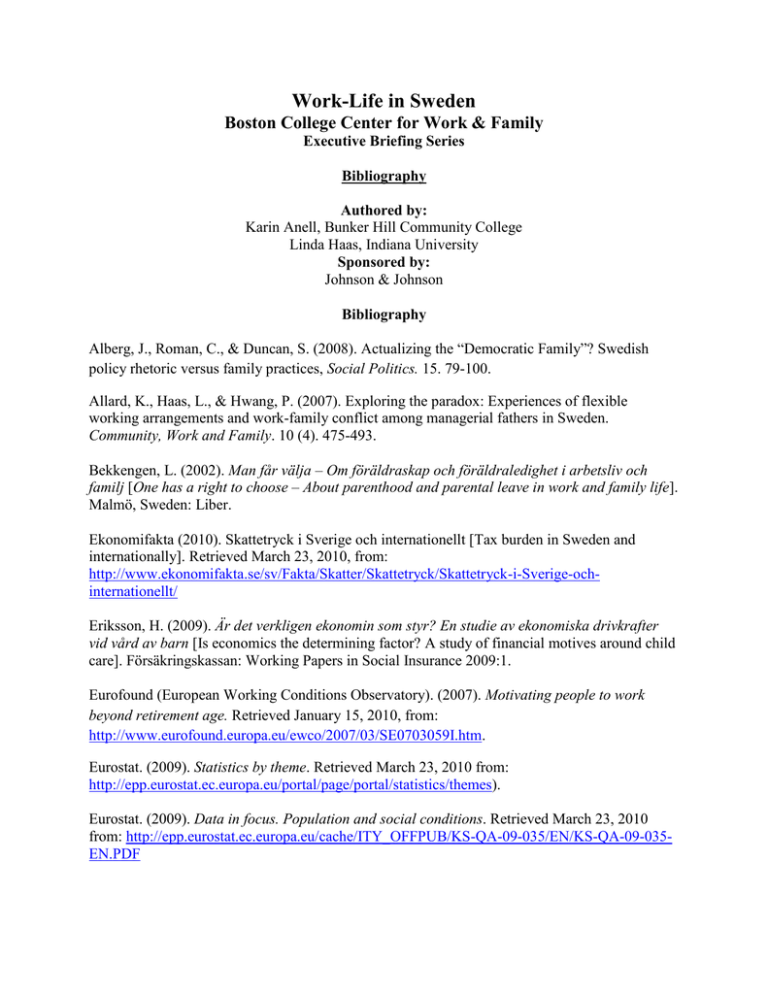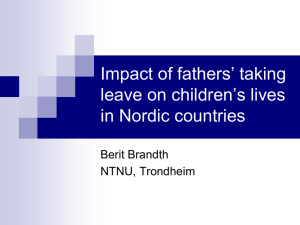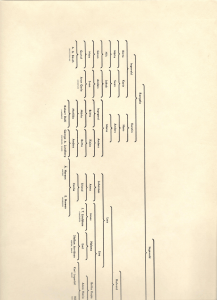Work-Life in Sweden Boston College Center for Work & Family
advertisement

Work-Life in Sweden Boston College Center for Work & Family Executive Briefing Series Bibliography Authored by: Karin Anell, Bunker Hill Community College Linda Haas, Indiana University Sponsored by: Johnson & Johnson Bibliography Alberg, J., Roman, C., & Duncan, S. (2008). Actualizing the “Democratic Family”? Swedish policy rhetoric versus family practices, Social Politics. 15. 79-100. Allard, K., Haas, L., & Hwang, P. (2007). Exploring the paradox: Experiences of flexible working arrangements and work-family conflict among managerial fathers in Sweden. Community, Work and Family. 10 (4). 475-493. Bekkengen, L. (2002). Man får välja – Om föräldraskap och föräldraledighet i arbetsliv och familj [One has a right to choose – About parenthood and parental leave in work and family life]. Malmö, Sweden: Liber. Ekonomifakta (2010). Skattetryck i Sverige och internationellt [Tax burden in Sweden and internationally]. Retrieved March 23, 2010, from: http://www.ekonomifakta.se/sv/Fakta/Skatter/Skattetryck/Skattetryck-i-Sverige-ochinternationellt/ Eriksson, H. (2009). Är det verkligen ekonomin som styr? En studie av ekonomiska drivkrafter vid vård av barn [Is economics the determining factor? A study of financial motives around child care]. Försäkringskassan: Working Papers in Social Insurance 2009:1. Eurofound (European Working Conditions Observatory). (2007). Motivating people to work beyond retirement age. Retrieved January 15, 2010, from: http://www.eurofound.europa.eu/ewco/2007/03/SE0703059I.htm. Eurostat. (2009). Statistics by theme. Retrieved March 23, 2010 from: http://epp.eurostat.ec.europa.eu/portal/page/portal/statistics/themes). Eurostat. (2009). Data in focus. Population and social conditions. Retrieved March 23, 2010 from: http://epp.eurostat.ec.europa.eu/cache/ITY_OFFPUB/KS-QA-09-035/EN/KS-QA-09-035EN.PDF Evertsson, M., & Duvander, A. (2009). Parental Leave – possibility or trap? Does family leave affect Swedish women’s labour market opportunities? SpaDE WP 2009:2 Sociology Department, Stockholm University. Federation of European Employers. (2010). Trade unions Across Europe. Retrieved March March 23, 2010 from: (http://www.fedee.com/tradeunions.html#toplist) Government Offices of Sweden (2009). Annual Leave Act SFS 1977:480. Retrieved on January 18, 2010 from: http://www.regeringen.se/sb/d/5807/a/104986). Haas, L., Chronholm, A., Duvander, A. & Hwang, C. P. (2009). “Country Note – Sweden.” In International Review of Leave Policies and Related Research 2009, edited by Peter Moss, pp. 326-336. Employment Relations Research Series No. 201. London, UK: British Department of Business Innovation and Skills. Haas, L. (2010). Work and family in Sweden. Network News. Sloan Work and Family Research Network. Chestnut Hill, U.S. Haas, L. & Hwang, P. (2007). Gender and organizational culture – Correlates of companies’ responsiveness to fathers in Sweden. Gender & Society. 21(1). Haas, L., & Hwang, P. (2009). Is fatherhood becoming more visible at work? Trends in corporate support for fathers taking parental leave in Sweden. Fathering. 7(3). Hofstede, G. (2001). Culture‟s Consequences. Comparing Values, Behaviors, Institutions and Organizations Across Nations. Thousand Oaks, CA: Sage Publications. Högskoleverket (2005). Swedish universities and university colleges - Short version of annual report. Retrieved April 15, 2010 from: www.hsv.se/download/18.539a949110f3d5914ec800087115/0537R.pdf Johansson, T. & Klinth R. (2007). Caring fathers: The ideology of gender equality and masculine positions. Men and Masculinities. 11 (1). Jonsson, D. (2007). Time-related flexibility and stability for employees. In B. Furåker, K. Håkonsson & J. Karlsson (Eds.), Flexibility and stablity in working life. Basinstoke: Palgrave MacMillan. Larsson. M. (2010). Arbetstider år 2009. Stockholm: Landsorganisationen i Sverige. Landsorganisationen (LO). (2010). Arbetslösheten viktigaste frågan i valet. RUT är lågprioriterat [Unemployment the most important question in the election]. Retrieved on April 17, 2010 from: http://www.lo.se/home/lo/home.nsf/unidview/2BCEB149162236BAC12576E100398C8B Moderaterna. (2010). Vår politik [Our politics]. Retrieved March 23, 2010 from: http://www.moderat.se/web/Var_Politik.aspx Nelander, S. & Golding, I. (2003). Röster inom facket och jobbet, Rapport nr 5 [Voices within unions and at the workplace]. Stockholm: Landsorganisationen i Sverige. New York Times. (2009). Nordic countries top „Gender Equality‟ list. Retrieved March 15, 2010, from: http://www.nytimes.com/2009/10/28/business/global/28gender.html?_r=210). Nylin, A-K. (2008). En av tre föräldrar upplever inte balans i livet [One of three parents does not experience life balance]. Välfärd. Nr. 3, 2008. OECD. (2009). StatExtracts. Country statistical profiles 2009. Retrieved September 21, 2009, from: http://stats.oecd.org/viewhtml.aspx?queryname=18170&querytype=view&lang=en Pensionsmyndigheten (Swedish Pensions Agency). (2009). When you retire. Retrieved January 15, 2010, from: http://www.pensionsmyndigheten.se/When you retire Regeringskansliet. (2007). Social insurance in Sweden. Retrieved February 9, 2010, from: http://www.sweden.gov.se/content/1/c6/07/94/49/e72e6119.pdf Statistiska Centralbyrån (SCB). (2008). På tal om kvinnor och män [Talking about women and men]. Stockholm: SCB. SCB (2007). Föräldraledighet och arbetslivskarriär. En studie av mammors olika vägar i arbetslivet.[Parental leave and work – A study of mothers‟ career choices]; SCB, Demografiska rapporter 2007:3 Statistiska Centralbyrån (SCB). (2010). Tabeller över Sveriges befolkning [Tables about Swedish population]. Retrieved on March 23, 2010, from: http://www.scb.se/Pages/GsaSearch____287280.aspx?QueryTerm=gifterm%c3%a5l&PageIndex =1 Svenskt Näringsliv. (n.d). Så kan vi skapa framtidens arbetsplats – bra för både kvinnor och män [Here‟s how we can create the workplace of the future – good for both women and men]. Retrieved on April 12, 2010 from: http://www.svensktnaringsliv.se/regioner/stockholm/drivaforetag-bra-for-jamstalldheten_25222.html Sverige Turism (2010). Absolutely Swedish – Outlining a Swedish character. Retrieved on March 18, 2010 from: http://www.sverigeturism.se/smorgasbord/smorgasbord/culture/swedish/index.html). Swedish Government. Strategy for gender equality on the labour market. (2009). Retreived on March 25, 2010, from: http://www.sweden.gov.se/sb/d/4096/a/130290: Swedish Institute. (2009). Education in Sweden. Retrieved March 19, 2010 from: http://www.sweden.se/eng/Home/Education/Basic-education/Facts/Education-in-Sweden/ Swedish Institute. (2009). History of Sweden. Retrieved April 5, 2010, from: http://www.sweden.se/eng/Home/Quick-facts/Facts/History-of-Sweden/. Swedish Institute, 2009. Sweden in brief / the “home of the people”. Retrieved April 13, 2010 from: http://www.sweden.se/eng/Home/Quick-facts/Sweden-in-Brief/Society-Welfare/. Swedish Institute. (2009). Sweden in brief / the “home of the people”. Retrieved April 13, 2010, from: http://www.sweden.se/eng/Home/Quick-facts/Sweden-in-Brief/Society-Welfare/. The Swedish Trade Union Confederation. (2010). The working hours act. Retrieved February 9, 2010 from http://www.lo.se/home/lo/home.nsf/unidView/2A7FE2D323327545C1256E51003A0BD8). Sydsvenskan. (2010). De sjukskrivna har inte varit färre på 29 år [The number receiving unemployment compensation for sickness lowest in 29 years]. Retrieved on February 2, 2010 from: http://www.sydsvenskan.se/sverige/article633943/De-sjukskrivna-har-inte-varit-farre-pa29-ar.html Sydsvenskan. (2008). Ohälsan kvar trots bättre statistik [Ill health persists despite improved statistics]. Retrieved March 23, 2010 from: www.sydsvenskan.se/sverige/ohalsan-kvar-trotsbattre-statistik.html Unionen. (2009). IT företaget CSC får guldnappen för bäst jämställdhet [IT Company CSC receives the Golden Pacifer for best gender equality]. Retrieved on April, 18 from: https://www.unionen.se/Templates/Page____40711.aspx. US Department of State. (2009). Background note Sweden. Retrieved April 5, 2010, from: http://www.state.gov/r/pa/ei/bgn/2880.htm. Van der Lippe, T., Jager, A., Kops, Y. (2006). Combination pressure: The paid work-family balance of men and women in European countries. Acta Sociologica, 49, 303-319. Walker, M. (2007, May 9). Sweden clamps down on sick and disability pay. Wall Street Journal. World Economic Forum. (2009). The Global Gender Gap Report 2009. Retreived on March 23, 2010, from: http://www.weforum.org/en/Communities/Women%20Leaders%20and%20Gender%20Parity/Ge nderGapNetwork/index.htm



